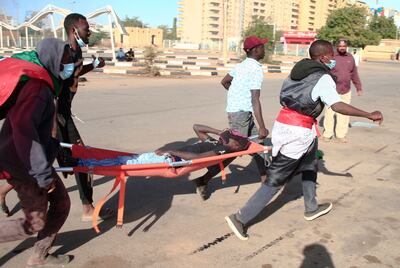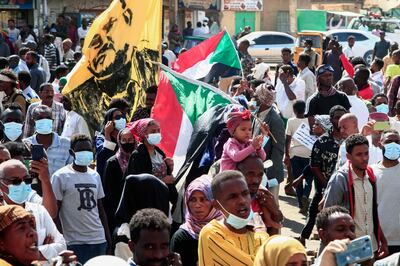Sudan’s prime minister Abdalla Hamdok announced his resignation on Sunday, six weeks after he was reinstated by army chief Gen Abdel Fattah Al Burhan to form a new government of independent technocrats.
In a televised address to the nation, Mr Hamdok said: "I have decided to return the mandate you trusted me with and declare my resignation as prime minister.”
Mr Hamdok and his government were dismissed by Gen Al Burhan when he seized power in a coup on October 25.
His reinstatement on November 21 cost the former UN economist his credibility and the support of the powerful pro-democracy movement that once stood firmly behind him.
His resignation will likely deepen Sudan's political crisis as street protests continue unabated against military rule.
Nearly 60 people have been killed in those protests since the coup, which upended the country's democratic transition.
The latest deaths came just hours before Mr Hamdok spoke, when security forces shot dead three protesters in the Khartoum district of Umm Dorman as thousands across the capital rallied against military rule.
In his address, Mr Hamdok, Sudan's first prime minister after the April 2019 ouster of dictator Omar Al Bashir, heaped lavish praise on the pro-democracy movement, singling out members of the Resistance Committees for special commendation.
He also outlined the trajectory of the rift between the civilian and military components of the transitional administration that took office in August 2019.
"Those divisions seeped into society and its different components, allowing hate speech and not recognising the other to surface," he said.
Looking back at Hamdok's return as prime minister - in pictures
"I have tried as much as I could to save the country from sliding into the abyss. Now, our country is going through a dangerous juncture that could threaten its very existence unless something is done quickly," he warned.
He urged all stakeholders to begin a dialogue about a national charter and a road map for the transitional period. Elections are expected to be held in July 2023.
Sunday's rallies were the 12th major protest since the military takeover. They were unexpectedly called by pro-democracy groups on Saturday night. The next round of demonstrations was originally due later this week.
Sunday's three fatalities were announced by the Central Doctors Committee, which is aligned with the pro-democracy movement, but has built a reputation for impartiality with its thorough tallying and verifying of victims of political violence since 2018.
"The shooting was unnecessary since no one really planned to march across the Nile to the Republican Palace as announced," said Sulaima Ishaq, a prominent activist from Umm Dorman who witnessed Sunday's rallies.
"It was tragic again today in Umm Dorman," she told The National.
She and another witness who requested anonymity said at least two of the three fatalities were killed by army soldiers who arrived in an armoured vehicle. The three, they said, were shot dead near a Nile bridge that leads to central Khartoum.
'Going back is impossible'
Footage from Umm Dorman shared online earlier on Sunday showed young men, some wrapping themselves in Sudanese flags, dancing to the beat of drums as women ululated.
"The people are stronger; going back is impossible," they chanted, alluding to a return of military rule.
"The revolution is the revolution of the people, to whom power belongs, and troops go back to their barracks," they joyfully shouted.
Gen Al Burhan has repeatedly said that he had ordered an investigation into the killing of protesters, but has never explained who would be investigating or when the findings would be announced.
He also routinely declares his support and admiration for the December Revolution - the name given to the four months of anti-Al Bashir protests in 2018 and 2019 - but appears unwilling to step down and make way for civilian rule as demanded by the pro-democracy movement behind the uprising.
“Let us make it a year of continuing and effective resistance; a graveyard for the arrogant tyrants and all those who oppress our glorious people,” the pro-democracy Sudanese Professionals’ Association said in a Saturday night statement, joining the Resistance Committees in calling for Sunday's rallies.
The two groups have mobilised protests against military rule since the October coup and were behind the protests against Al Bashir, which forced the military to remove him in April 2019.

Responding to the call for rallies on Sunday, security forces on Saturday night blocked bridges across the Nile that connect the sprawling Sudanese capital, according to witnesses and photos shared online. The tactic prevents protesters from gathering in numbers large enough to push through lines of security forces.
Authorities also cut off internet and mobile phone services on Sunday morning, a measure routinely used to stop protesters from co-ordinating and exchanging information during the rallies.
In an address on Saturday night to mark Sudan's 66th independence anniversary, Gen Al Burhan said the country was facing existential threats that could not be ignored and called for dialogue to end the political crisis. He gave no specifics.
Separately, a statement issued after a meeting on Saturday night of the military-led Security and Defence Council appeared to absolve security forces of responsibility for the killing of more than 50 people during protests since October 25. Hundreds of others were injured as security forces used tear gas, rubber bullets, stun grenades and live rounds to disperse protesters.
“The council commended the efforts made by the security agencies and the wisdom they have shown in dealing with security threats,” said the statement issued by the Sovereignty Council, a collective presidency led by Gen Al Burhan.
Sunday’s rallies come only days after tens of thousands of protesters took to the streets in Khartoum. At least five protesters were killed on Thursday and nearly 300 were injured.

Witnesses said security forces used unusually excessive force on Thursday, beating up children, chasing protesters on to side streets, firing tear gas in hospitals treating the wounded and stopping ambulances from ferrying the injured.
They said the methods were similar to those used against protesters during the uprising against Al Bashir's rule.
The acting deputy minister, Haitham Awadallah, resigned on Friday in protest against the "disrespect" shown by security forces to the sanctity of hospitals, in a letter seen by The National.
"Things have reached the stage where hospitals are repeatedly stormed and their workers along with visitors and patients are beaten and subjected to tear gas," Mr Awadallah said in his letter to Gen Al Burhan.










